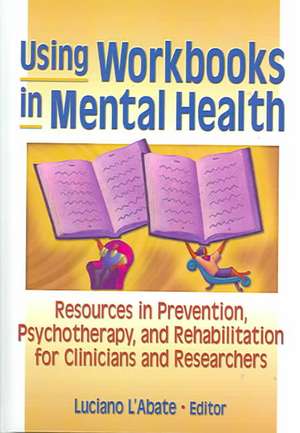Using Workbooks in Mental Health: Resources in Prevention, Psychotherapy, and Rehabilitation for Clinicians and Researchers
Autor Luciano L'Abateen Limba Engleză Hardback – 20 iul 2004
Using Workbooks in Mental Health: Resources in Prevention, Psychotherapy, and Rehabilitation for Clinicians and Researchers examines the effectiveness of mental health workbooks designed to address problems ranging from dementia and depression to addiction, spousal abuse, eating disorders, and more. Compiled by Dr. Luciano L’Abate, a leading authority on mental health workbooks, this resource will help clinicians and researchers become aware of the supportive evidence for the use of workbooks.
Using Workbooks in Mental Health examines workbooks designed to specifically help:
- clients affected by dementia or depression
- abused women
- gambling addicts
- women who have substance-abuse addictions
- incarcerated felons
- couples preparing for marriage
- children with school refusal disorder
- and more!
In addition, this book shows how workbooks can be used to administer therapy to previously unreachable clients such as:
- people who are reluctant to talk to an authoritative figure or a stranger
- people who cannot afford face-to-face treatments
- incarcerated offenders who have not been helped by talk therapies
- Internet users who are searching for help via computer rather than in person
Preț: 265.79 lei
Preț vechi: 315.24 lei
-16% Nou
Puncte Express: 399
Preț estimativ în valută:
50.87€ • 53.02$ • 42.35£
50.87€ • 53.02$ • 42.35£
Comandă specială
Livrare economică 16-30 decembrie
Doresc să fiu notificat când acest titlu va fi disponibil:
Se trimite...
Preluare comenzi: 021 569.72.76
Specificații
ISBN-13: 9780789015938
ISBN-10: 0789015935
Pagini: 428
Ilustrații: Illustrations
Dimensiuni: 152 x 212 x 33 mm
Greutate: 0.82 kg
Ediția:1
Editura: Taylor & Francis
Colecția Routledge
Locul publicării:Oxford, United Kingdom
ISBN-10: 0789015935
Pagini: 428
Ilustrații: Illustrations
Dimensiuni: 152 x 212 x 33 mm
Greutate: 0.82 kg
Ediția:1
Editura: Taylor & Francis
Colecția Routledge
Locul publicării:Oxford, United Kingdom
Cuprins
- About the Editor
- Contributors
- Foreword (James W. Pennebaker)
- Preface
- SECTION I: INTRODUCTION
- Chapter 1. The Role of Workbooks in the Delivery of Mental Health Services in Prevention, Psychotherapy, and Rehabilitation (Luciano L’Abate)
- The Status of Mental Health Needs in the United States
- The Status of Individual Psychotherapy
- Toward an Increasing Formalization of Psychological Interventions
- Implications of an Increasing Trend in Formalization
- Differences Between Clinical Practice and Research
- Workbooks in Current Psychological Literature
- Overview of Workbook Administration
- Toward a Classification of Writing
- Toward a Classification of Workbooks
- Advantages of Workbooks
- Metafunctions of Workbooks
- Disadvantages and Dangers of Workbook Administration
- Testing Theories Through Workbooks
- On the Nature of Evidence to Support Workbook and Structured Computer-Assisted Interventions
- Importance of Evaluation and Informed Consent for Workbook Administration
- Successful Sieves and Stepped Treatment in the Delivery of Mental Health Services
- Conclusion
- Chapter 2. Systematically Written Homework Assignments: The Case for Homework-Based Treatment (Luciano L’Abate)
- Professional Antecedents of Systematically Written Homework Assignments
- Workbooks As Extensions of Existing Knowledge
- Bridging the Semantic Gap
- Research with SWHAs
- A Meta-Analysis of Workbook Effectiveness
- Professional Implications
- Conclusion
- SECTION II: INDIVIDUALS
- Chapter 3. Dementia, Depression, and Workbooks: A Personal Odyssey (Everett Gorman)
- The Problem of Depression
- Completing Personal Assignments for Depression
- Conclusion
- Chapter 4. Life-Challenging Conditions and Helpers (Rubin Battino)
- Description of Workbooks
- Workbook for People Who Have a Life-Challenging Disease
- Workbook for Caregivers
- Workbook for Grieving
- Results from a Brief Survey
- Susan and Bill: A Case Study
- Implications and Conclusions
- Chapter 5. Schema-Focused Cognitive Therapy: A Stage-Specific Workbook
Approach (Demián F. Goldstein) - Rationale and Background for the Creation and Development of the Workbook
- Description of the Workbook
- Administering the Workbook
- The Stage-Specific Schema Inventory
- Implications for the Role of Workbooks in Cognitive-Behavioral Therapy
- Implications of the Present and Future Use of Workbooks in Mental Health Interventions
- Appendix: A Sample Assignment from the 3S Workbook—Crisis Three, Initiative versus Guilt
- Chapter 6. Healing the Trauma of Abuse: A Women’s Workbook (Ellen Arledge, Joselyn Y. Barsfield, Caroline L. Mitchell, Emily Moody, and Carolina J. Quesada)
- Description of Workbook
- Results of Workbook Administration
- Clients’ Comments Concerning Workbook Utilization
- The Role of Workbooks in Prevention
- Implications for Using the Workbook in Practice
- Conclusion
- Chapter 7. Workbooks for Individuals with Gambling Problems: Promoting the Natural Recovery Process Through Brief Intervention (David C. Hodgins)
- Recovery from Problem Gambling
- Natural versus Treatment-Assisted Recovery
- Applying the Stepped Care Model to Problem Gambling
- Self-Help Workbooks in Addictions
- Developing a Self-Help Workbook for Problem Gamblers
- Clinical Trial
- Conclusion
- Chapter 8. The Wheel of Wisdom with Depressed Inpatients (Piero De Giacomo, Marco Storelli, Andrea De Giacomo, Caterina Tarquinio, Giovanni
Descriere
Using Workbooks in Mental Health: Resources in Prevention, Psychotherapy, and Rehabilitation for Clinicians and Researchers examines the effectiveness of mental health workbooks designed to address problems ranging from dementia and depression to addiction, spousal abuse, eating disorders, and more. Compiled by Dr. Luciano L'Abate, a leading authority on mental health workbooks, this resource will help clinicians and researchers become aware of the supportive evidence for the use of workbooks. Therapists and researchers share their success stories and reveal how these cost-effective tools will help clients outside of traditional face-to-face therapy.
